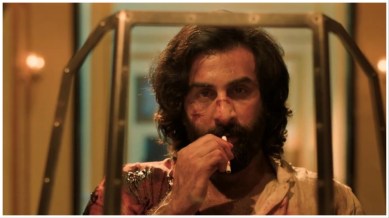Click here to follow Screen Digital on YouTube and stay updated with the latest from the world of cinema.

Sandeep Reddy Vanga’s latest offering Animal could well have been the title to a Kabir Singh sequel where he became wealthy and then lost his wife Preeti. Instead, we have Ranbir Kapoor playing Ranvijay Singh Balbir, whose father Balbir Singh is called India’s wealthiest and most powerful man multiple times in the first half. But running a business empire across three time zones means he has no time for his family. In Vanga-land, this fractures his son’s psyche and turns him into a chauvinistic, sexist, bloodthirsty mass murderer. Single parents and families with fathers whose jobs separate them from their children for monetary reasons, you have been warned.
As I tried very hard to deal with the nausea I felt during the blood-soaked pre-interval sequence, I couldn’t help but think about three things- First, is Balbir’s absence a bigger crime than his wife and extended family’s wilful negligence of Ranvijay’s troubled behaviour? Second, while all of us carry some resentments, anger or trauma from our childhoods, just how many years can we blame our parents or our pasts for how we deal with the present and future? Thirdly, and most importantly, why does Bollywood find it so hard to present a parent-child relationship realistically? Though Animal was promoted as a father-son relationship carved in blood, it is a film where a man uses his troubled relationship with his father to give in to his latent psychopathic tendencies. But sadly, this is not the first time that we have seen problematic parent-child relationships on screen.
Baldev Singh (Amrish Puri) in Dilwale Dulhaniya, Yashwardhan Raichand and Narayan Shankar (Amitabh Bachchan) in Kabhi Khushi Kabhie Gham and Mohabbatein, Kamal Mehra (Anil Kapoor) in Dil Dhadakne Do, Veeru Sahastrabuddhe in 3 Idiots (Boman Irani), Dhankor (Supriya Pathak) in Goliyon ki Rasleela Ramleela), to the half-humorous half murderous fathers in films like Ishq, Dil, and several others — controlling fathers projecting their need for social validation on their children is now almost an archetype rather than a character type in Bollywood. We also have a whole subset of toxic parents who pass on a legacy of revenge to their children. From Trishul where Amitabh avenged his mother played by Waheeda Rehman, who was abandoned by Sanjeev Kumar; Karan Arjun where Rakhee manifested the rebirth of her sons to get revenge; to films Ram Lakhan, Agneepath, and Baazigar — kids being handed the responsibility of retribution as a matter of duty is perhaps the most troubling parenting trope in our cinema.
While some parents are problematic because of their aggressive behaviour, others are worrisome because they are either too indulgent or kind until they are being obeyed. All the parents in Barjatya land are loving on paper, but that is because they have kids who know better than to ever voice an opinion. Wake Up Sid was a great movie in many ways, but as a parent, I wonder why Anupam Kher or his wife never course-corrected till their son failed in college.
Over the years though, we have evolved from unquestioning obedience and deification to calling out parents and caregivers on their toxic traits. Films like 3 Idiots, Taare Zameen Par, Dear Zindagi and most recently Rocky Aur Rani Kii Prem Kahani, are some examples of films which attempt to break generational trauma. Movies like these not only have parents who acknowledge their problematic behaviour and make amends but also children who voice their unhappiness instead of suppressing their anger under the garb of respect.
A wonderful quote that I came across recently says, ‘The real flex is healing yourself without becoming like those who traumatised you’. Or as David Rossi said in the TV series Criminal Minds, “Scars remind us where we have been. They don’t have to dictate where are going”.
But sadly, Vanga would rather undo years of effort taken by individuals across fields of work to make sure that we don’t undermine mental illness or deem violence against women as an act of passion. He believes a man telling a woman about her body being suitable for childbearing, having an affair to further the cause of his revenge, grabbing his wife’s throat when he is angry, or using love bites as a shade card for the car he wants are all perfectly okay if he loves his father and wants to take care of his family. People push the envelope in cinema by choosing to be more inclusive or trying new technology and narrative techniques. Vanga just gets a bigger budget, a bigger star, and celebrates the type of masculinity that has made the world an unsafe place for us to live in. Quite like Donald Trump who normalised the feelings of racists and white supremacists or politicians closer home who turn a blind eye to violence against minority communities, Vanga uses his films to tell men that their base instincts and violent impulses are not wrong at all. Just as long as they find someone to love whom they can blame their behaviour on.
Click here to follow Screen Digital on YouTube and stay updated with the latest from the world of cinema.